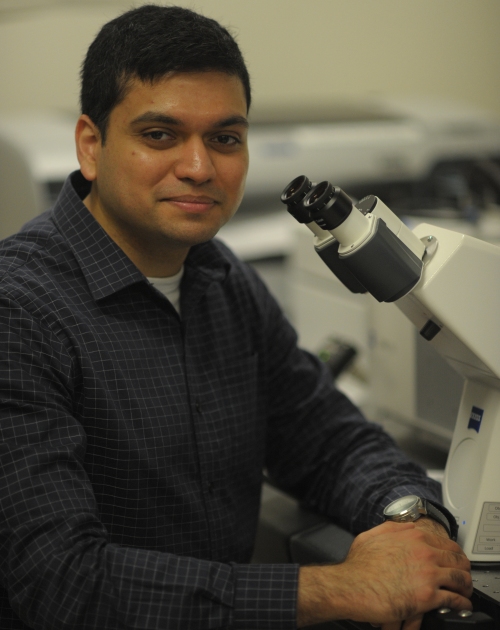
Nikhil Raghuram, PhD graduate, is looking forward to starting research as a medical student.
Photo credit: Greg Sawisky
From an early age, Nikhil Raghuram knew he would spend his life studying cancer. This year's centennial convocation ceremony will take him one step closer to his dream.
Raghuram, an MD/PhD student in the Faculty of Medicine & Dentistry, will accept his PhD in oncology at the June 7 medical school convocation. The MD/PhD program allows students to graduate with a medical degree and a PhD, given successful completion of the requirements. He has also completed the first year of the MD program.
For Raghuram's PhD research he examined how chromatin, the combination of DNA and proteins that constitute the nucleus of a cell, is altered through interactions with cancer cells. He completed this research in Dr. Michael Hendzel's lab.
"This brand of research that I'm doing will hopefully come into translational use to give some benefit to patients in the next 10 to 15 years," he said of his thesis research. "That's what I'm trying to work on: translating what we learned from cells that are growing in a dish to a patient, and how it can be applicable [and beneficial] to them."
Raghuram's life was touched by cancer long before he started studying it beneath a microscope: he was 5-years old when his grandfather passed away from the disease. Though he was too young to truly understand the circumstances, he credits this experience as the first building block toward his career in oncology. His interest continued to grow when, in high school, his close friend lost a two-year battle with lymphoma.
"That was the first time we started learning about cancer in our high school biology class. [It was kind of weird] having to see one of my close friends suffer through that, like when he went through radiation and he didn't have any hair," he said. "He still managed to come back and finish all of his exams, which was really inspirational. Here we were complaining about exams and he just walks in after having a round of chemo. It put things into perspective for me. From then on, I made up my mind. I wanted to study cancer."
This decision took him to the University of Alberta, where he completed a B.Sc. in biochemistry prior to applying to the MD/PhD program. Raghuram successfully defended his PhD thesis on August 17, 2012, officially completing the first five years of what will be a nine-year program. The following week, he was sitting in his first class of medical school.
Though his PhD was complete, the research wasn't. In order to complete the experiments tied to his thesis, Raguhram spent a good portion of the first eight months of medical school in a laboratory at the Cross Cancer Institute. He would attend a full day of class, spend three hours each evening in the lab, then return home for review and homework. Weekends were also spent in the lab. Despite the long days, there is no doubt in Raghuram's mind that he made the right choice.
"What I'm looking forward to in years three and four [of medical school] is trying to understand diseases from a clinician's perspective. That's what excites me the most. That's going to be very interesting because of my background," he said, adding he's looking forward to starting research projects as a medical student. "We haven't fully realized the potential of translating what we learn from the bench to the bedside. That's where the effort needs to be in order to translate that into patient care and patient well-being. In order for that change to occur, we need people who can understand these pathways and try to apply it in the broader concept of patient care."
Raghuram will receive his medical degree with the class of 2016. He hopes to continue his medical education with a residency in oncology.